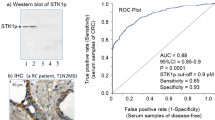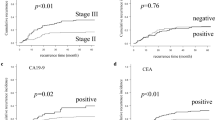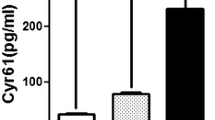Summary
Background
Thymidine kinase 1 was regarded as a good serological marker for cell proliferation. In recent years, the role of thymidine kinase 1 in occurrence, development, and prognosis of tumors gradually attracted people’s attention and had been regarded as a sensitive indicator of tumor. The aim of the present study was to investigate the clinical value of detection of serum thymidine kinase 1 in colorectal carcinoma.
Methods
In this study, the level of serum thymidine kinase 1 in 150 patients with colorectal carcinoma, 36 patients with benign colorectal diseases, and 40 normal controls was determined by a chemiluminescence dot blot assay.
Results
The level of serum thymidine kinase 1 in patients with colorectal carcinoma was much higher than that in patients with benign colorectal diseases and normal controls (P < 0.01), but there was no significant difference between the level of serum thymidine kinase 1 in patients with benign colorectal diseases and that in normal controls (P > 0.05). The level of serum thymidine kinase 1 declined significantly 1 month after operation. The positive rate of serum thymidine kinase 1 in patients with colorectal carcinoma was much higher than other digestive tumor markers [carcinoembryonic antigen (CEA), carbohydrate antigen (CA-199, CA-724)].
Conclusions
The detection of serum thymidine kinase 1 might have high clinical value in auxiliary diagnosis, curative effect monitoring, and prognosis judgment of colorectal carcinoma.
Similar content being viewed by others
References
Li Z, Wang Y, He J, et al. Serological thymidine kinase 1 is a prognostic factor in oesophageal, cardial and lung carcinomas. Eur J Cancer Prev. 2010;19(4):313–8.
Zhang F, Li H, Pendleton AR, et al. Thymidine kinase 1 immunoassay: a potential marker for breast cancer. Cancer Detect Prev. 2001;25(1):8–15.
Aufderklamm S, Todenhöfer T, Gakis G, et al. Thymidine kinase and cancer monitoring. Cancer Lett. 2012;316(1):6–10.
Guan H, Sun Y, Zan Q, et al. Thymidine kinase 1 expression in atypical ductal hyperplasia significantly differs from usual ductal hyperplasia and ductal carcinoma in situ: a useful tool in tumor therapy management. Mol Med Rep. 2009;2(6):923–9.
Xu XH, Zhang YM, Shu XH, et al. Serum thymidine kinase 1 reflects the progression of pre-malignant and malignant tumors during therapy. Mol Med Rep. 2008;1(5):705–11.
Wu BJ, Li WP, Qian C, Ding W, Zhou ZW, Jiang H. Increased serum level of thymidine kinase 1 correlates with metastatic site in patients with malignant melanoma. Tumour Biol. 2013;34(2):643–8.
Bolayirli M, Papila C, Korkmaz GG, et al. Serum thymidine kinase 1 activity in solid tumor (breast and colorectal cancer) patients treated with adjuvant chemotherapy. J Clin Lab Anal. 2013;27(3):220–6.
Luo P, He E, Eriksson S, et al. Thymidine kinase activity in serum of renal cell carcinoma patients is a useful prognostic marker. Eur J Cancer Prev. 2009;18(3):220–4.
Zhou J, He E, Skog S. The proliferation marker thymidine kinase 1 in clinical use. Mol Clin Oncol. 2013;1(1):18–28.
He Q, Mao Y, Wu J, et al. Cytosolic thymidine kinase is a specific histopathologic tumour marker for breast carcinomas. Int J Oncol. 2004;25(4):945–53.
Lee SJ, Lee HJ, Moon DH. Quantitative analysis of thymidine kinase 1 and 5′(3′)-deoxyribonucleotidase mRNA expression: the role of fluorothymidine uptake. Anticancer Res. 2011;31(6):2135–9.
Xiang Y, Zeng H, Liu X, et al. Thymidine kinase 1 as a diagnostic tumor marker is of moderate value in cancer patients: a meta‑analysis. Biomed Rep. 2013;1(4):629–37.
Chen G, He C, Li L, et al. Nuclear TK1 expression is an independent prognostic factor for survival in pre-malignant and malignant lesions of the cervix. BMC Cancer. 2013;13:249.
Chen F, Tang L, Xia T, et al. Serum thymidine kinase 1 levels predict cancer‑free survival following neoadjuvant, surgical and adjuvant treatment of patients with locally advanced breast cancer. Mol Clin Oncol. 2013;1(5):894–902.
Karbownik M, Brzezianska E, Lewinski A. Increased expression of mRNA specific for thymidine kinase, deoxycytidine kinase or thymidine phosphorylase in human papillary thyroid carcinoma. Cancer Lett. 2005;225(2):267–73.
Faria M, Halquist MS, Kindt E, Li W, Karnes HT, O’Brien PJ. Liquid chromatography–tandem mass spectrometry method for quantification of thymidine kinase activity in human serum by monitoring the conversion of 3-deoxy-3-fluorothymidine to 3-deoxy-3-fluorothymidine monophosphate. J Chromatogr B Analyt Technol Biomed Life Sci. 2012;907:13–20.
Bjöhle J, Bergqvist J, Gronowitz JS, et al. Serum thymidine kinase activity compared with CA 15-3 in locally advanced and metastatic breast cancer within a randomized trial. Breast Cancer ResTreat. 2013;139(3):751–8.
Hannigan BM, Barnett YA, Armstrong DB, McKelvey-Martin VJ, McKenna PG. Thymidine kinases: the enzymes and their clinical usefulness. Cancer Biother. 1993;8(3):189–97.
Xu Y, Shi QL, Ma H, et al. High thymidine kinase 1 (TK1) expression is a predictor of poor survival in patients with pT1 of lung adenocarcinoma. Tumour Biol. 2012;33(2):475–83.
Nisman B, Yutkin V, Nechushtan H, et al. Circulating tumor M2 pyruvate kinase and thymidine kinase 1 are potential predictors for disease recurrence in renal cell carcinoma after nephrectomy. Urology. 2010;76(2):513.e1–6.
Korkmaz T, Seber S, Okutur K, et al. Serum thymidine kinase 1 levels correlates with FDG uptake and prognosis in patients with non small cell lung cancer. Biomarkers. 2013;18(1):88–94.
He Q, Skog S, Wang N, Eriksson S, Tribukait B. Characterization of a peptide antibody against a C-terminal part of human and mouse cytosolic thymidine kinase, which is a marker for cell proliferation. Eur J Cell Biol. 1996;70(2):117–24.
Huang S, Lin J, Guo N, et al. Elevated serum thymidine kinase 1 predicts risk of pre/early cancerous progression. Asian Pac J Cancer Prev. 2011;12(2):497–505.
Alegre MM, Weyant MJ, Bennett DT, et al. Serum detection of thymidine kinase 1 as a means of early detection of lung cancer. Anticancer Res. 2014;34(5):2145–51.
Procházka V, Faber E, Raida L, Langová K, Indrák K, Papajík T. High baseline serum thymidine kinase 1 level predicts unfavorable outcome in patients with follicular lymphoma. Leuk Lymphoma. 2012;53(7):1306–10.
Chen ZH, Huang SQ, Wang Y, et al. Serological thymidine kinase 1 is a biomarker for early detection of tumours—a health screening study on 35,365 people, using a sensitive chemiluminescent dot blot assay. Sensors (Basel). 2011;11(12):11064–80.
Nisman B, Allweis T, Kaduri L, et al. Serum thymidine kinase 1 activity in breast cancer. Cancer Biomark. 2010;7(2):65–72.
Pan ZL, Ji XY, Shi YM, Zhou J, He E, Skog S. Serum thymidine kinase 1 concentration as a prognostic factor of chemotherapy-treated non-Hodgkin’s lymphoma patients. J Cancer Res Clin Oncol. 2010;136(8):1193–9.
Alegre MM, Robison RA, O’Neill KL. Thymidine kinase 1 upregulation is an early event in breast tumor formation. J Oncol. 2012;2012:575647.
Huang ZH, Tian XS, Li R, et al. Elevated thymidine kinase 1 in serum following neoadjuvant chemotherapy predicts poor outcome for patients with locally advanced breast cancer. Exp Ther Med. 2012;3(2):331–5.
Li HX, Lei DS, Wang XQ, Skog S, He Q. Serum thymidine kinase 1 is a prognostic and monitoring factor in patients with non-small cell lung cancer. Oncol Rep. 2005;13(1):145–9.
Zhang J, Jia Q, Zou S, et al. Thymidine kinase 1: a proliferation marker for determining prognosis and monitoring the surgical out-come of primary bladder carcinoma patients. Oncol Rep. 2006;15(2):455–61.
Acknowledgments
This research was supported by grants from the Key Scientific and Technological Project of Henan Province in China (No. 132102310061).
Ethical standards statement
In this study, all procedures followed were in accordance with the ethical standards of the Institutional Ethic Committee of Henan Cancer Hospital on human experimentation. The experimental protocol and informed consent procedure were in compliance with the Helsinki Declaration of 1975, as revised in 2008 (5).
Statement of informed consent
In this study, informed consent was obtained from all patients for being included in the study. All persons gave their informed consent prior to their inclusion in the study. Details that might disclose the identity of the subjects under study have been omitted.
Conflict of interest
Yongchao Zhang, Jiaxiang Wang, Jianguo Xie, Donghua Yang, Guangsen Han, Qiang Fu, and Yonglei Zhang declare that they have no conflict of interest.
Author information
Authors and Affiliations
Corresponding author
Rights and permissions
About this article
Cite this article
Zhang, Y., Wang, J., Xie, J. et al. The assay and clinical significance of serum thymidine kinase 1 in patients with colorectal carcinoma. Eur Surg 47, 248–253 (2015). https://doi.org/10.1007/s10353-015-0342-8
Received:
Accepted:
Published:
Issue Date:
DOI: https://doi.org/10.1007/s10353-015-0342-8




